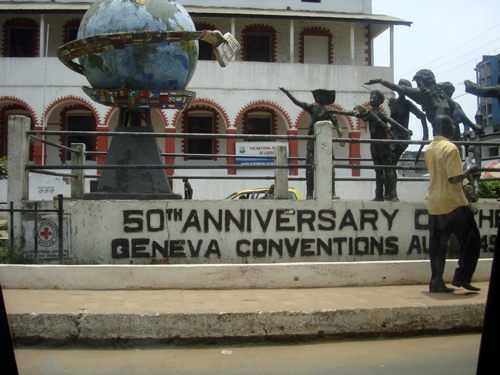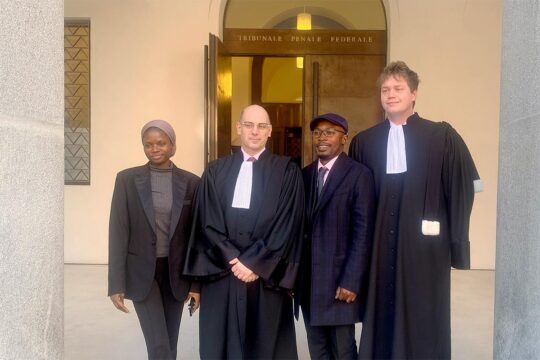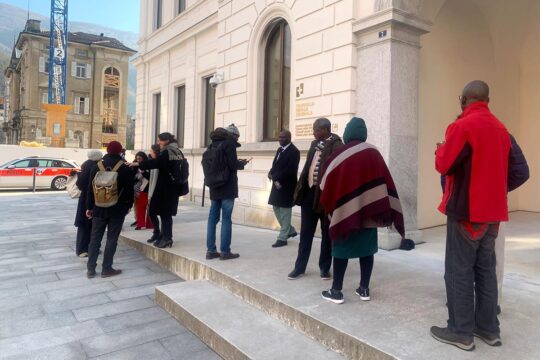"We are witnessing the greatest humanitarian crisis of our lifetime,” says the website of the first World Humanitarian Summit, to be held in Istanbul in May. And it proclaims that “the World Humanitarian Summit is our chance to end it”. The agenda includes preventing and ending conflict, and strengthening respect for the rules of war. International Humanitarian Law (IHL), based around the Geneva Conventions, is supposed to protect civilians and non-combatants in time of war. But with mass atrocities every day against civilians in Syria, South Sudan, Afghanistan and elsewhere, and floods of refugees as a result, IHL appears to be in crisis. In the run-up to the World Humanitarian Summit the International Committee of the Red Cross, a Swiss NGO often seen as a custodian of IHL, is holding a series of public discussions around the issue. JusticeInfo reports on a debate in Geneva on April 21, where panellists raised the problem of how to engage with non-State actors such as Islamic State (Daesh), as well as get more compliance from State parties and better justice.
“Never before has the need for IHL been so great,” said panellist Adama Dieng, the UN Secretary General’s Special Representative on Prevention of Genocide. “When you look around the world, the level of human suffering is so great, as is the violation of IHL. I am thinking, for example, of the bombing of the MSF hospital in Kunduz and health facilities in Yemen, of conflicts in South Sudan, South Kordofan and the Nuba Mountains in Sudan. Civilians are indiscriminately affected and they pay with their lives.”
Panellists seemed to agree that the humanitarian crises hitting our world are unprecedented, even if they should be put in historical context. We should not, for example, forget the Second World War and the genocides in Rwanda and Bosnia. But the modern world also poses new challenges, the panellists pointed out. New technology has brought drones, for example, which whilst saving State security forces from risking their lives on the ground are still killing civilians. Social media has been a powerful tool for democracy, but also for propaganda and recruitment by groups such as Daesh. States often fail in their obligations, but now there is also a proliferation of non-State actors that are hard to engage and hard to hold to account.
The problem of non-State actors
Panellists agreed that the rise of violent non-State actors (Daesh, Al-Quaida, Al Shabaab, etc), with little respect for the law and often weak command structures to hold activists to account, is one of the major challenges of our time.
Panelist Marco Sassoli, Professor of International Law at Geneva University, said non-State groups need to be engaged, and pointed to NGOs like Geneva Call which are doing this. “I am convinced they can be engaged,” he said. “They are made up of human beings like States and you have to understand their problems. If you isolate and criminalize them, it’s a self-fulfilling prophesy. Many are fighting to become a government, so do they want a country in ruins?”
The basic message of IHL is to “respect the enemy”, Sassoli said, but States mostly do not. They are often too ready to accuse the other side whilst committing violations themselves, he says, which hinders dialogue and generates disrespect.
Dieng also thinks non-State actors need to be engaged. “You are not born a terrorist, you become one,” he told the conference. “We need to understand why and how to engage with them and, if that is not possible, how to prevent the spread of violent terrorism.”
Here governments should also play a stronger role, he said. “What we need is to get governments to manage diversity. We need strong, cohesive societies.”
Panellist Fiona Terry, an independent researcher for the ICRC, suggested that more research is needed on why armed groups commit atrocities against civilians. “We’d like to turn the question on its head and ask what restrains armed groups from atrocities,” she said. “Why didn’t the LTTE in Sri Lanka commit rape as others did? Why, after the genocide in Rwanda, did it not happen in Côte d’Ivoire, when it could have gone the same way?”
She suggested that groups who need to win the “hearts and minds” of the population will not commit atrocities like those who only want to grab resources, and that in all cases they are subject to influence, including peer pressure. “What are the sources of influence on these groups?” she asked. “And how can we tap into them to make them respect IHL?”
State responsibility and justice
The conference also discussed the responsibility of States, which have an obligation to respect IHL. “IHL is a delicate dance between two interests: the ability of States to fight and win, and the protection of civilians,” said American panelist Mike Schmitt, Professor of International Law at the US Naval War College and University of Exeter. “If it gets out of balance with regard to humanitarian concerns, States won’t respect IHL.”
Another problem, he says, is that whilst “only States have the authority to make law”, they often opt out of the process, because it suits them to keep the rules of war ambiguous. “If States are going to opt out of the process, this comes with great risk,” he said, with a particular reference to his own country (the US). “They are surrendering the battle space and this brings disrespect.”
IHL is supposed to prevent atrocities against civilians in times of war. But if that doesn’t work, it can also be used to punish perpetrators in national and international criminal courts, such as the International Criminal Court (ICC) in The Hague.
UN Special Representative on the Prevention of Genocide Adama Dieng said accountability for crimes committed should also be part of the strategy, and called for more support for the ICC. “The ICC needs support, despite the Kenyan move to withdraw from it,” he said. “If there are African diplomats in this room, I would ask them to think twice and remember that the ICC prosecutes individuals, not States.”






